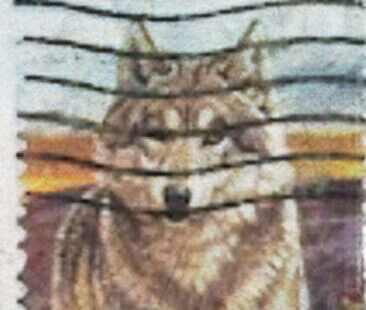Sean O’Connor
Noelie
Noelie hated The Church, and he said it in his book. It was a really big book, more than two hundred pages. Imagine, Noelie Grimes writin’ all that!
Even though he lived here for years no-one knew how much Noelie had done—all the places he’d lived and everything. There was a load of photographs in the middle, all old lookin’, in black and white. Noelie outside an Irish bar where he’d worked in Canada, at a cannery in Florida, singing on a street in Paris, with builders in Nottingham, all that stuff. The one that made me laugh though, was of him standin’ beside a donkey in New York where it said he asked people to give him money to support Ireland—and they did!
There was a great view from his flat at the top of the main tower. I was in it when the American ship anchored out in the bay for a few days, an aircraft carrier. It was gigantic.
‘Look at that fuckin’ thing,’ I sez, ‘even though it’s miles away, it’s still ginormous.’
We’re sittin’ there gazing at it, sayin’ nothin’. Then I sez: ‘It’s intimidating all the same, isn’t it?’
‘Meant to be,’ sez Noelie. ‘Imagine that thing opening up, raining hell down on us; we wouldn’t stand a chance.’
‘Not up here in-anyway,’ I sez.
‘Not anywhere,’ sez Noelie.
dark grey warship passing under its shadow a shoal of herring
Bit by bit I read his book. He grew up on The Hill, in the tenements I mean. When he was six his Da was crushed to death by a crane that fell over where he worked.
Noelie had loads of brothers and sisters, but one of them died before he was born, and another was dead before Noelie could remember, so by the time his Da was gone there was just six of them left, including his Ma. Before that they lived in two rooms, but they moved into a one-room once there was only six of them—to save rent.
There were six of us too, but none of us died, not when I was young in-anyway. Even though we lived in a one-room, it was nice really. The toilet was indoors and right beside our room so we didn’t have to queue or try to guess when its free ‘cause we could hear it flushin’ and that. And there was a long narrow garden we could play in without any hassle.
Noelie and them had to go down loads of stairs to a toilet in a little concrete yard. It was always freezin’ (so was ours though, now I think of it).
The real difference was Noelie’s Ma. She didn’t drink. And she was always singing, even in the daytime. She was a cleaner in Arnotts and had loads of friends.
And Noelie liked school, that’s another difference between me and him. He loved writing and drawing, but he was good at everything.
Spring sunlight . . . the slow sound of pencil soft on Foolscap
When Noelie was ten his mother was singing as she washed the potatoes. She stopped suddenly and fell down. Her face went purple and everyone was crying. She was brought to The Mater, and the next morning she was dead.
snow at the window . . . the pull of a long strand from mother’s hairbrush
That’s all in the book, and how Noelie felt there was a kind of magic happening the way it snowed for the whole day of her funeral. It says in the book:
‘It was a slow snow, as gentle as she was, and most of the day it kind of hovered in the air, lowering itself gradually, almost reluctantly, and gradually too, the grey world we lived in became brighter, the dirt and grime of our impoverished streets and buildings became fresh and clean, and there was a brilliance in all this.
Then I realised what my mother was; she was another kind of beauty, quiet and transformative. In some unnoticeable way she surrounded us with a kind of calm joy, and everything became wonderful around her. Around us.’
black funeral horse . . . snowflake after snowflake melting on his back
I know this bit ‘cause I cut it out and walked to Mr. Printo in Finglas and got it laminated. It wasn’t a great idea ‘cos then I couldn’t read most of the next page, but I didn’t mind, it made me feel happy for years—reading that bit of Noelie’s book. I never knew someone could love their Ma that much. Or that a Ma could be so lovely.
It’s become a kind of prayer for me, this little bit of writing. I made loads of copies, hand-written, printed, laminated, framed; and I make a point of reading it whenever I get the 29 bus, ‘cos this bus passes where Noelie did a terrible thing the year after his book was out, after he’d been on the telly and the radio, and even got paid to go to England just to talk about it.
above traffic . . . a joyful din of children with sycamore seeds
The thing about Noelie was that although he wasn’t what you might call ‘chirpy’, he never looked sad. And he never blew his top or got in scraps with anyone. That’s where the surprise is, I suppose.
But in-anyway, you can’t blame him for what he did. Everyone wants to do that sometimes. I know I do. And it makes sense, I guess, after what happened when his Ma died.
All the kids were sent to different houses and Noelie went to an aunty in Phibsborough. A couple of weeks later, a woman came there with a priest. There were Gardai too, but they stayed in the background and didn’t say anything.
Noelie was sent to a boys home in the middle of nowhere. It sez in his book that he hated it there. Every morning any boy who pissed in his bed got the leather. There was a queue for that sometimes and they were usually the small boys. Noelie hated to hear them all cryin’ and that.
The school was in the same place, in the same big buildings where they slept in huge rooms together, and ate in a big canteen, and never went anywhere except once a year when they were made climb Croagh Patrick with millions of other people, in their bare feet. Fuck tha’.
Even though I didn’t cut it out, I remember one thing Noelie sez in the book about that place:
‘This is a heartless enclave, damp and stony.’
I like that word, enclave, and after Noelie explained it to me I sez ‘The blocks are a kind of enclave.’
‘You have it in one,’ he sez.
I didn’t hear it for years, not until war broke out in Yugoslavia, then journalists were saying it all the time.
In-anyway, another boy had the same birthday as Noelie and as soon as they were eighteen they fucked off together and made it all the way to Nottingham to stay with the boy’s uncle, who was a builder. Noelie liked it there, but after a while he headed off to live in different countries, mainly Canada and America. He came back to Ireland ten years later and ended up with all of us in the blocks.
Sometimes I wish that battleship would come back and fill the bay with menace again and I could sit with Noelie on his balcony and drink cans until we’re bursting so much we could piss in a huge arc that would go out over the city and cover the heads of the gunners with our spray.
I want to say ‘fuck ‘em.’ And I want to hear Noelie laugh at that, as he would.
Autumn dusk . . . from a silent sycamore something is swaying
No-one around here knows what the last things Noelie wrote were. We know it was a lot, the telly said so, and it was written by hand on yellow foolscap found between his shirt and his chest. There was a protest outside the copshop for everyone to see what he wrote. We want to know his last words, what he said that isn’t in the book.
eve of Advent . . . tickling his sallow back greying chest hair
About the Author

Sean O’Connor is the founder and editor of The Haibun Journal, a judge of the Genjuan International Haibun Contest, and has been writing haibun and haiku for 30 years. His first solo collection, Let Silence Speak (Alba Publishing, 2016), was shortlisted for the Touchstone Distinguished Books Award 2016. His latest book is Fragmentation (Alba Publishing, 2021). He currently lives in rural Ireland.
